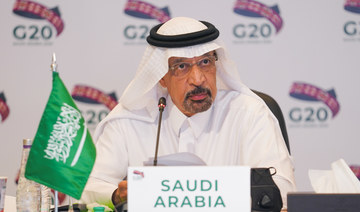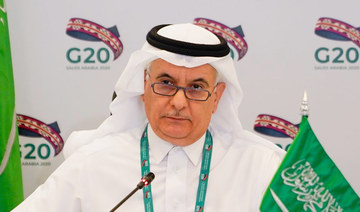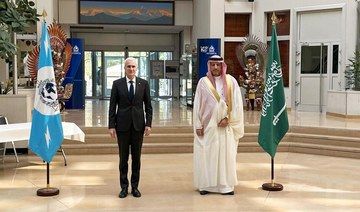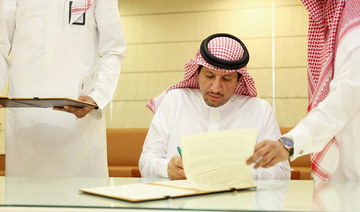JEDDAH: The G20’s Think 20 (T20) engagement group hosted an online event on Tuesday to discuss the threats and challenges posed by climate change, and consider possible solutions. In particular, they examined ways in which carbon emissions can be reduced or offset.
The Task Force 2: Climate Change and Environment webinar, organized in corporation with the Institute of Energy Economics in Japan, was the second virtual T20 event in the run-up to the main G20 meeting in Riyadh in November.
The sessions included discussions about the circular carbon economy; the blue carbon economy; ways to encourage cooperation on climate action; conservation and the restoration of biodiversity; and how climate concerns might affect post-pandemic economic recovery and vice versa.
The aim was to identify strategies and develop recommendations that can be presented during the main G20 Summit for actions that can be taken to curb climate change and achieve the goals of the 2016 Paris Agreement.
“Climate change is at the heart of global issues,” said Dr. Noura Mansouri, a research fellow at King Abdullah Petroleum Studies and Research Center (KAPSARC), and lead co-chair of TF2.
“It’s an urgent global challenge and requires urgent action — not just individual action but a coordinated approach — and the G20 is an important platform for that to happen. In fact, if the G20 does not use its platform for climate change, I don’t think any other platform will be as powerful and impactful for climate action.”
About 30 percent of global CO2 emissions come from carbon-intensive industries such as iron and steel, petrochemicals and transport. Experts believe the best way to effectively tackle the issue and achieve the Paris Agreement targets is by adopting a circular carbon economy.
“Embracing all energy technologies under the ‘four Rs’ of the circular carbon economy is important: to reduce, reuse, recycle and remove carbon,” Mansouri said during a panel discussion. “It is an essential means to (achieve) a low-carbon future through coordinated G20 efforts to support carbon-management and technology innovations.
“The Saudi G20 presidency is proposing the circular carbon economy as an integrated and inclusive approach to transition toward a more comprehensive, resilient, sustainable and climate-friendly energy system.”
Decarbonization is vital to achieving the goals of the Paris Agreement, and nature-based solutions can help, experts say.
“The circular carbon economy makes sense because it’s how nature manages carbon, through a close balance between emissions and removal of carbon dioxide,” said Prof. Carlos Duarte, who holds the Tarek Ahmed Juffali Research Chair in Red Sea Ecology at the King Abdullah University of Science and Technology.
Discussions and debates about climate change and its effects on the environment have been going on for some time, but investment in nature-based solutions is increasingly in the spotlight, especially since the COVID-19 pandemic began.
Blue carbon is another way in which nature can help tackle emissions. It refers to carbon that is captured by marine and coastal ecosystems, such as mangroves, tidal marshes and seagrass meadows. They are capable of storing more carbon than land-based ecosystems, such as forests, and are increasingly recognized for the vital role they can play in mitigating the effects of climate change.
“Rather than finding new technologies, not knowing their side effects, we have nature-based solutions — let nature recuperate,” said Ralph Chami, assistant director of the Institute for Capacity Development at the International Monetary Fund.
As evidence grows that many of the same human activities that are fueling climate change have also contributed to the spread of the coronavirus, including the growing popularity of air travel, one key option explored during the webinar was to place a transition to green energy at the heart of post-pandemic economic-recovery plans.
The discussion focused heavily on the role of the private sector in facilitating such a transition and the need for more accurate data on fossil fuels. The session was moderated by Dr. Aisha Al-Sarihi, a research associate at KAPSARC, and the panelists included Dr. Leila Dagher, an associate professor of economics at the American University of Beirut; Jonathan Stern, a distinguished research fellow at the Oxford Institute for Energy Studies; and Mari Luomi, an independent expert on climate, energy policy, politics and environmental sustainability.
By giving more than 160 experts from around the world the chance to work together to produce 24 policy briefs, T20 Saudi Arabia presented a golden opportunity to highlight pressing global issues to the leadership of the G20.
“When it comes to our journey as the T20, and over the past year of bringing together global think tanks to think with us and provide the ideas bank for the G20 Saudi presidency, we can’t but appreciate the efforts that went into it,” said Mansouri.
“We must see the COVID-19 crisis as a lesson in how to address climate change quickly and cooperatively. Coordinated G20 efforts are vital in pursuing this goal. Post-pandemic economic-recovery stimulus packages should not derail climate actions, and must utilize a circular carbon economy framework to simultaneously address social and environmental concerns while stimulating economic prosperity for a more inclusive and sustainable future.”
Saudi Arabia holds the presidency of the G20 this year and the group’s annual summit is due to be held in Riyadh in November. The T20, a network of think tanks and researchers, is one of several independent G20 engagement groups, led by organizations from the host country. They focus on different sections and sectors of society and develop policy recommendations that are presented to G20 leaders for consideration.
Nature holds one of the keys to tackling climate change, say G20 thinkers
https://arab.news/c7me2
Nature holds one of the keys to tackling climate change, say G20 thinkers
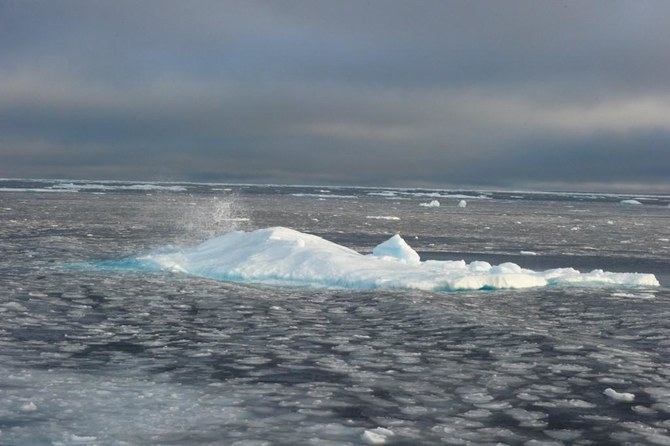
- Think 20 engagement group highlights ways nature can help deal with carbon emissions while world transitions to green energy
- Decarbonization is vital to achieving the goals of the Paris Agreement, and nature-based solutions can help, experts say
UK Deputy PM Dowden sets £30bn Saudi-UK 2030 bilateral trade goal

- Dowden led largest UK overseas trade delegation of the past decade to the GREAT Futures Conference in Riyadh
- Deputy PM praises ‘stronger than ever’ relationship between the two kingdoms
RIYADH: During an interview with Arab News on the sidelines of the GREAT Futures Conference, UK Deputy Prime Minister Oliver Dowden underlined London’s goal of reaching £30 billion ($37.7 billion) of bilateral trade by 2030.
“The idea of this (GREAT Futures Conference) is to be a sort of shop window to show the opportunities for our two countries and then out of that, I think there’s huge opportunities for further trade and investment,” he said.
“We set an ambitious goal by 2030 of £30 billion of bilateral trade. It’s already growing quite rapidly. It’s about £17 billion. I think we can push it to that.”
The two-day conference from May 14, hosted at King Abdullah Financial District, features 47 sessions and workshops with 127 speakers from both the public and private sectors.
The conference aims to spark and strengthen Saudi-UK partnerships in 13 sectors such as tourism, culture, education, health, sports, investment, trade and financial services.
It welcomed 450 British delegates and company heads to meet with Saudi businesses and officials.
Dowden said he that he thinks “the relationship between our two kingdoms is stronger than it’s ever been.
“It’s based on very firm foundations, whether that’s diplomatic, military or the relationship, indeed, between His Majesty (King Charles III) and (Crown Prince Mohammed bin Salman) in the royal family of Saudi Arabia.”
Dowden underlined that what he has witnessed during the GREAT Futures Conference and through the previous visits is “the huge opportunities for the future.
“The crown prince has set out the Vision of 2030. UK companies … want to be part of that vision, and that’s why I’ve brought the largest trade delegation the UK has taken to any country in the world in the past decade, the largest ever, to Saudi Arabia,” he said.
In the opening remarks of day one, the deputy prime minister spoke on a panel alongside Dr. Majid bin Abdullah Al-Qasabi, the Saudi minister of commerce.
He said there is a lot more that the two countries can do in the fields of technology and artificial intelligence.
“I think there’s a lot more we can do to collaborate together there because there’s huge expertise in artificial intelligence in Saudi Arabia,” Dowden said.
During his interview with Arab News Dowden also underlined that North East England is poised to receive investments worth £3 billion from the Kingdom.
“If you look at the North East of England, just one part of the UK, we’ve agreed £3 billion worth of investment that will support 2,000 jobs. I think there’s much more that we can do like that,” he said.
Leading up to the conference, the deputy prime minister stressed the importance of the event in building partnerships between the business sectors of Saudi Arabia and the UK.
“It (GREAT Futures) also allows British companies to familiarize themselves with relevant business regulations, incentives, and advantages for conducting business in Saudi Arabia,” Dowden said.
49th Saudi relief plane for Gazans arrives in Egypt

- The food baskets will be transported to Palestinian people inside the Gaza Strip and is part of the Kingdom’s support for them
RIYADH: The 49th Saudi relief plane carrying food baskets for Gazans arrived at Egypt’s El Arish International Airport on Tuesday.
The plane was operated by the King Salman Humanitarian Aid and Relief Center in coordination with the Ministry of Defense, Saudi Press Agency reported.
The food baskets will be transported to Palestinian people inside the Gaza Strip and is part of the Kingdom’s support for them.
The war in the Strip has pushed much of Gaza’s population to the brink of famine, the UN says, and has devastated its medical facilities, where hospitals, if working at all, are running short of fuel to power generators and other essential supplies.
Riyadh forum to combat financial crime and corruption

- Brings together key stakeholders from the Middle East and North Africa to combat financial crime, money laundering, and terrorist financing
- Two-day forum aims to establish impactful collaboration among Saudi agencies, counterpart organizations, and regional and international bodies to combat financial crime
RIYADH: The inaugural Arab Forum of Anti-Corruption Agencies and Financial Intelligence Units begins Wednesday in Riyadh, hosted by the Presidency of State Security.
It brings together key stakeholders from the Middle East and North Africa to combat financial crime, money laundering, and terrorist financing through enhanced cooperation and capabilities.
The two-day forum aims to establish impactful collaboration among Saudi agencies, counterpart organizations, and regional and international bodies to combat financial crime effectively, according to the forum’s website.
Recognizing the need for a multi-faceted approach, the forum focuses on cooperation across borders, sectors, and disciplines to combat corruption.
Through international collaboration, elevating local institutional integrity, and engaging citizens, the forum aims to tackle corruption and financial crime challenges effectively.
Leveraging private sector efforts, deploying technology for transparency, and addressing root causes of corruption are also part of the agenda.
The event will feature 75 speakers from 25 countries, including Sheikh Ahmed Al-Thani, head of Qatar Financial Information Unit; Samya Abou Sharif, director of the Jordanian Anti Money Laundering and Counter-Terrorist Financing Unit; Dr. Raed Radwan, head of the Palestinian Anti-Corruption Commission; and Richard Attias, CEO of FII Institute.
By uniting government agencies, law enforcement bodies, financial intelligence units, civil society organizations, and the private sector, the forum harnesses collective wisdom and expertise against financial crime.
The forum also facilitates networking, knowledge-sharing, and capacity-building, fostering partnerships and concrete initiatives for progress in anti-corruption efforts.
Saudi FM meets with Kuwaiti counterpart

- The ministers discussed ways of strengthening bilateral relations and regional and international developments of common interest
RIYADH: Saudi Foreign Minister Prince Faisal bin Farhan met with his Kuwaiti counterpart Abdullah Ali Al-Yahya on Tuesday, Saudi Press Agency reported.
The meeting took place on the sidelines of a preparatory meeting for Arab League foreign ministers in Manama, Bahrain.
The ministers discussed ways of strengthening bilateral relations and regional and international developments of common interest.
Saudi cabinet welcomes UN resolution supporting Palestine’s full membership

RIYADH: The Saudi cabinet welcomed on Tuesday the United Nations assembly's resolution supporting Palestine's full membership, the Saudi State Agency reported.
The council of ministers emphasizing the need to halt Israeli military escalations and violations against civilians and humanitarian workers.
Minister of Information, Salman bin Youssef Al-Dosari, reiterated the Kingdom's commitment to global security, active participation in international relief efforts, and advocacy for issues affecting Arab and Islamic nations.
The council also discussed the recent reception of pilgrims arriving for Hajj.
Directives were issued to maintain high standards of procedures and services at entry points in Makkah, Medina, and the Holy Sites.
The council also received a comprehensive briefing on recent diplomatic dialogues with various nations, including discussions between the Crown Prince Mohammed bin Salman and the President of Ukraine.



